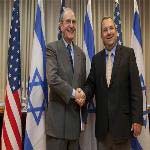
Listen to Susan Yackee's interview with Middle East analyst David Pollack, with the Washington Institute for Near East Policy, about the U.S. effort to resolve the Israeli-Palestinian conflict: U.S. special envoy George Mitchell has been meeting with Israeli officials in preparation for the start of indirect talks between Israel and the Palestinians. Mr. Mitchell is due to start shuttling between Jerusalem and the West Bank on Friday, after both sides agreed to begin their first indirect negotiations in 16 months.
Even as they agreed to start indirect talks, both sides disagreed whether the negotiations had officially begun.
Palestinian leaders say they have yet to give formal approval for the U.S.-mediated negotiations, but said the talks would officially start Saturday. Israel considered the negotiations to have begun on Wednesday, when U.S. envoy George Mitchell met with Israeli Prime Minister Benjamin Netanyahu.
Those meetings continued behind closed doors in Tel Aviv, as Mitchell prepared to take Israel's first set of statements to the Palestinians on Friday when he crosses into the West Bank.
That both sides have agreed to talk is seen as a breakthrough. Negotiations have been at a total standstill for 16 months.
Confidence building
The goal is to build enough trust and reach enough common ground to begin direct negotiations, something the Palestinians are not willing to do until Israel stops building settlements in the occupied West Bank and in East Jerusalem.
Palestinian presidential spokesman Nabil Abu Rudeineh tells VOA the Palestinians want Israel to take confidence-building steps in these proximity talks or risk peace process collapse again.
"If the Israelis will continue building settlements, and if the Israelis continue putting obstacles, and if the Israelis continue wasting the time, that will be a real problem," he said.
The Palestinians have put a four-month deadline on the indirect talks. Abu Rudeineh says they are relying on the United States to put pressure on Israel.
"As we have told the Americans many times, we are committed to the peace process," he said. "They cannot keep just telling us that we should go back to the negotiation, there should be a serious Israeli partner looking forward to have real, serious negotiations."
Protecting security
Israel says its main concern is protecting its own security, but says it is willing to discuss all issues in the proximity talks. Israeli officials have not said specifically what they are proposing to the Palestinians in these negotiations.
Analysts say they hope the talks will, at the very least, yield details of what the Jewish State is prepared to offer. Akiva Eldar is a senior columnist with Haaretz newspaper in Tel Aviv.
"I expect to know hopefully in the next few days or weeks what my government is putting on the table," he said. "What are they willing to offer the Palestinians in return for peace, because Israel is holding the goods. I know what the Palestinians are offering. I do not think this is going to change."
The talks are expected to last several months. Mitchell, who built his reputation as a skillful mediator in resolving the conflict in Northern Ireland, will put to work the patience for which he is known.
Netanyahu: Israel must rely only on itself
Israel lifts restrictions on Palestinians as violence subsides
Israelis lift West Bank closure as tensions ease
US reaffirms support of Israel, Palestinians threaten to cancel negotiations
(来源:VOA 编辑:陈丹妮)
